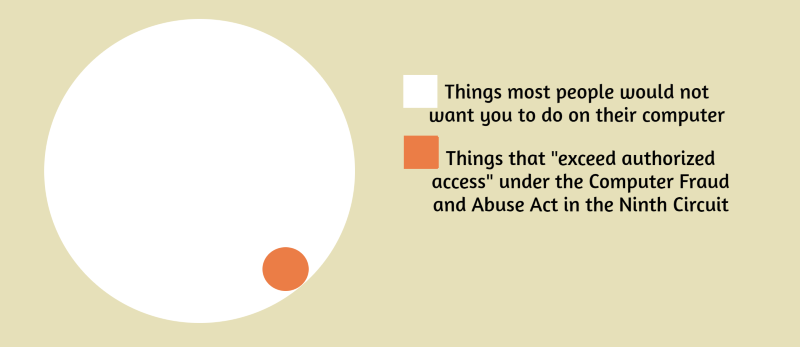Fink v. Time Warner Cable, 2011 WL 3962607 (S.D.N.Y. September 7, 2011)
Plaintiffs sued Time Warner (the provider of Road Runner High Speed Online internet access), alleging, among other things, that Time Warner’s alleged “throttling” of plaintiffs’ internet communications violated the Computer Fraud and Abuse Act, 18 USC 1030 (“CFAA”). Specifically, plaintiffs alleged that without their authorization, Time Warner sent forged reset packets which frustrated plaintiffs’ peer-to-peer communications (e.g., BitTorrent and other P2P mechanisms) as well as their use of Skype.
Time Warner moved to dismiss the CFAA claims. The court granted the motion as to claims that required plaintiffs to plead “loss” as defined by the statute. As for those claims that required only allegations of “access” and “damage,” the court denied the motion to dismiss and let the case move forward.
Plaintiffs brought three claims under the CFAA, one under each of subparts (A), (B) and (C) of 18 USC 1030(a)(5). This part of the statute provides liability for anyone who:
(A) knowingly causes the transmission of a program, information, code, or command, and as a result of such conduct, intentionally causes damage without authorization, to a protected computer;
(B) intentionally accesses a protected computer without authorization, and as a result of such conduct, recklessly causes damage; or
(C) intentionally accesses a protected computer without authorization, and as a result of such conduct, causes damage and loss.
No CFAA loss
The CFAA defines “loss” as “any reasonable cost to any victim, including the
cost of responding to an offense, conducting a damage assessment, and restoring the data, program, system, or information to its condition prior to the offense, and any revenue lost, cost incurred, or other consequential damages incurred because of interruption of service.”
In this case, plaintiffs alleged that the loss they suffered arose from their payments for high-speed internet services allegedly not received, costs to prevent Time Warner’s throttling practice and the costs of obtaining information elsewhere when they were unable to use their computers for file transfers and VoIP communications. Plaintiffs also pled losses relating to time and effort in assessing “damage” to each computer for which transmissions were interrupted.
The court found these alleged losses to be outside the scope of those contemplated by the CFAA. Plaintiffs did not allege that they needed to restore data,a program, a system, or information to its condition prior to Time Warner’s conduct. The court held that Plaintiffs had failed to adequately plead this element of a CFAA claim. So it dismissed the claim plaintiffs had brought under 18 USC 1030(a)(5)(C).
“Damage” and “access” adequately pled
Plaintiffs’ failure to adequately plead loss was not the end of the case. Since subparts (A) and (B) of 18 USC 1030(a)(5) do not require one to plead “loss,” but do require pleading “damage” and “access,” the court turned its attention to see if those elements were adequately pled. It found that they were.
The CFAA defines “damage” as “any impairment to the integrity or availability of data, a system, or information.” Plaintiffs alleged that Time Warner impaired their ability to obtain data and utilize their computer systems by knowingly transmitting “reset packets to [their] computers with the intention of impeding or preventing [their] peer-to-peer transmissions” and that damage was caused because the reset packets “compromis[ed] the internal software of [their]computers and impair[ed] their ability to receive and transmit data.” The plaintiffs also alleged that the throttling process prevented data exchange and inhibited certain use of their computers. In addition, plaintiffs identified the specific types of information that had its availability “impeded” and identified a particular program, Skype, that was rendered unusable by the alleged throttling.
As for “access,” the court looked to the plain meaning, dictionary definition of the word for guidance (since the term is not defined in the CFAA). Plaintiffs had alleged that Time Warner accessed their computers in violation of the statute by knowingly transmitting reset packets to plaintiff’s computers and otherwise accessed their computers to impede data receipt and transmission.” Giving the term “access” a broad meaning, the court found these allegations to satisfy the CFAA requirement.


 Plaintiff sued defendant (a former employee) under the Computer Fraud and Abuse Act (“CFAA”) alleging that defendant intentionally and without authorization accessed plaintiff’s computers, intranet, and email system and sent plaintiff’s confidential customer information to his personal email account. Defendant allegedly used this information when he went to work for a competitor. Plaintiff also alleged that defendant attempted to conceal his actions by deleting the outgoing messages from the work email account.
Plaintiff sued defendant (a former employee) under the Computer Fraud and Abuse Act (“CFAA”) alleging that defendant intentionally and without authorization accessed plaintiff’s computers, intranet, and email system and sent plaintiff’s confidential customer information to his personal email account. Defendant allegedly used this information when he went to work for a competitor. Plaintiff also alleged that defendant attempted to conceal his actions by deleting the outgoing messages from the work email account.  Defendant resigned from his job with an IT consulting firm. One of the firm’s customers hired defendant as an employee. Before the customer/new employer terminated the agreement with the IT consulting firm/former employer, defendant used the customer/new employer’s credentials to access and copy some scripts from the system. (Having the new employee and the scripts eliminated the need to have the consulting firm retained.) The firm/former employer sued under the
Defendant resigned from his job with an IT consulting firm. One of the firm’s customers hired defendant as an employee. Before the customer/new employer terminated the agreement with the IT consulting firm/former employer, defendant used the customer/new employer’s credentials to access and copy some scripts from the system. (Having the new employee and the scripts eliminated the need to have the consulting firm retained.) The firm/former employer sued under the 
